Unit 3 Could you please clean your room Section B 1a_1e精美教学教案(新人教版八年级下)
2019年八年级英语下册 Unit 3 Could you please clean your room知识点总结 (新版)人教新目标版
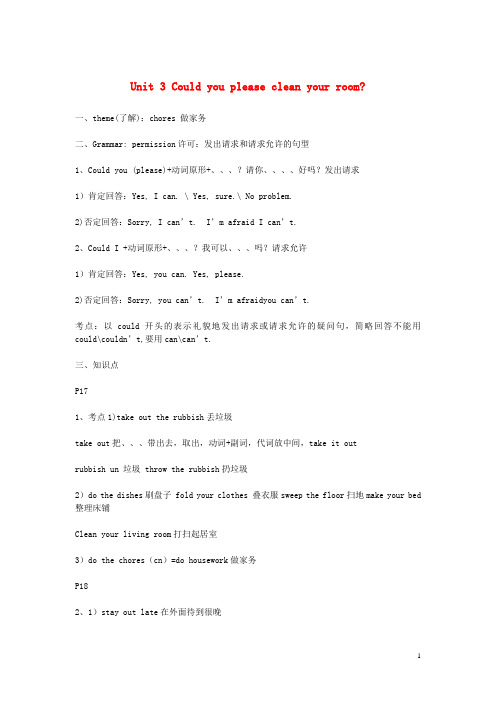
Unit 3 Could you please clean your room?一、theme(了解):chores 做家务二、Grammar: permission许可:发出请求和请求允许的句型1、Could you (please)+动词原形+、、、?请你、、、、好吗?发出请求1)肯定回答:Yes, I can. \ Yes, sure.\ No problem.2)否定回答:Sorry, I can’t. I’m afraid I can’t.2、Could I +动词原形+、、、?我可以、、、吗?请求允许1)肯定回答:Yes, you can. Yes, please.2)否定回答:Sorry, you can’t. I’m afraidyou can’t.考点:以could开头的表示礼貌地发出请求或请求允许的疑问句,简略回答不能用could\couldn’t,要用can\can’t.三、知识点P171、考点1)take out the rubbish丢垃圾take out把、、、带出去,取出,动词+副词,代词放中间,take it outrubbish un 垃圾 throw the rubbish扔垃圾2)do the dishes刷盘子 fold your clothes 叠衣服sweep the floor扫地make your bed 整理床铺Clean your living room打扫起居室3)do the chores(cn)=do housework做家务P182、1)stay out late在外面待到很晚2)get a ride 搭便车 3)need to do sth 需要做某事(need实义动词)need do sth(情态动词)4)have to do sth 不得不做某事3、1)help (sb) out with sth帮助(某人)做某事(常指帮助某人摆脱困境)2)at least至少3)finish doing sth做完某事4、1)Two hours of TV isenough for you.短语(名词短语、现在分词短语、不定式短语)作主语,谓语动词用单数。
Unit3 Could you please clean your roo1

Unit3 Could you please clean your room?Section A(1a-2d)学习目标: 1.掌握1a-2d的词语2.学习提出礼貌的请求和请求允许;3.学会使用句型:Could you please...?和Could I...?;学习重点:掌握一些家务活动相关的动词短语。
掌握情态动词could的用法和助动词do的用法。
学习难点:掌握情态动词could的用法和助动词do的用法【一】自主学习明确目标1 试读单词,解决语音问题,联系有关旧单词2 查阅下面的短语动词1) 出去吃饭_______________ 2)在外面待到很晚_______________3)去看电影_______________ 4)搭车_______________5)完成做某事_______________ 6)干净整洁_______________7)洗餐具_______________ 8)倒垃圾_______________9)叠衣服_______________ 10)扫地_______________3.观察以上词组的构成方式:【语言点】1. —Peter, could you please take out the trash?请你把垃极倒掉好吗?—Sure, Mom.可以,妈妈。
—Could you please do the dishes? 请洗盘子好吗?—Sorry, I can’t. I have to do my homework.抱歉,我不能。
我得做作业。
(1)在表示请求帮助或请求允许的疑问句中,常用could代替can,以表示礼貌,委婉或不确定的语气,而can则不具备这些语气。
这种情况下不能把could看作can的过去式。
以上两句中用could是为了表示礼貌的请求。
表示请求帮助或请求允许时,除了can, could之外,还可以用may,句子的表达方式也各有不同,可以用不同的方式来表示同一个概念。
八年级英语下册 Unit 3 Could you please clean your room知识点
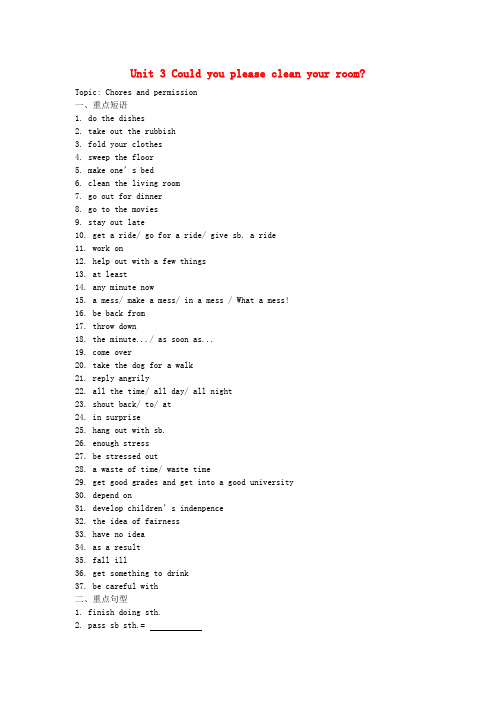
Unit 3 Could you please clean your room?Topic: Chores and permission一、重点短语1. do the dishes2. take out the rubbish3. fold your clothes4. sweep the floor5. make one’s bed6. clean the living room7. go out for dinner8. go to the movies9. stay out late10. get a ride/ go for a ride/ give sb. a ride11. work on12. help out with a few things13. at least14. any minute now15. a mess/ make a mess/ in a mess / What a mess!16. be back from17. throw down18. the minute.../ as soon as...19. come over20. take the dog for a walk21. reply angrily22. all the time/ all day/ all night23. shout back/ to/ at24. in surprise25. hang out with sb.26. enough stress27. be stressed out28. a waste of time/ waste time29. get good grades and get into a good university30. depend on31. develop children’s indenpence32. the idea of fairness33. have no idea34. as a result35. fall ill36. get something to drink37. be careful with二、重点句型1. finish doing sth.2. pass sb sth.=3. lend sb. sth. =4. borrow sb. sth =5. hate6. ask sb.7. invite sb. to sp.invite sb. to do sth.8. make sb.9. time /10. in order to do sth11. provide /12. there is no need for sb to do sth=13. mind doing sth.14. do one’s part in doing sth.三、词形变化1. (n.) ----angry(adj.) -----angrily(adv.)2. surprise (n. )---- (adj.)3. (n.) ----comfortable(adj.)4. invite(v.) ---- (n.)5. stress(n.) ------ (adj.)6. depend(v.) -----dependent(adj.) -----denpendency(n.)---- (adj.)------- (n.) opposite7. fair( adj.) ----- (n.)--- (adj.) opposite8. develop---- (adj.) ---- (n.)9. care (n/v.) ---- (adj.)--- (adj.) opposite四、好句欣赏1. I think two hours of TV (be) enough for you.2. Mom happy if she this mess.3. I am just tired you are.4. one week, she didn’t do any housework and .did any housework.she me did any housework.5. I finally understand that we need to share the housework (have) a clean and comfortable home.6. Could we just let them do their job as students?7. They should spend their time schoolwork in order to get good grades and get into a good university.8. It is the parent s’job (provide) a clean and comfortable environment at home their children.9. And anyway, I think doing chores is not so difficult, I do not mind doing them.10. It is not enough to just get good grades.11. Doing chores helps to develop children’s (independent) and teaches 22them how(take care) of themselves.12. Since they live in one house with their parents, they should know that everyone should do their part in keeping it clean and tidy.13. The earlier kids learn to be independent, the better it is for their future.五、Grammar(could)1. It is used as the past form of the modal verb .Mary could read by herself at the age of four.2. It is used to ask for permission.Could I please do…?Could I please use your phone?Could I practice playing the piano after school?How do we reply to these requests?3. It is used to make polite requests.Could you pleas e do … ?Could you babysit for us on Friday?Could you please turn on the TV for me?How do we reply to these requests?4. It can also be used to .A: I hope to work outside.B: You could help to clean up the city parks.5. People sometimes use “could” to .A: Whose book is this?B: I am not sure. It could be Carla’s. She was here just now.3。
Unit 3 Could you please clean your room?(解析版)
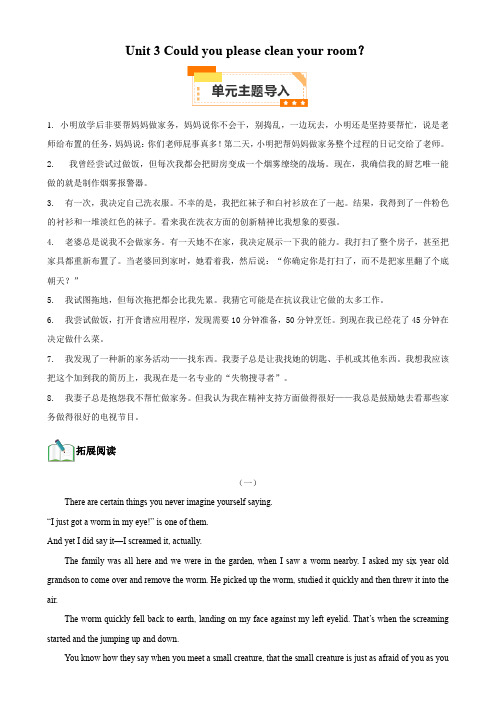
Unit 3 Could you please clean your room?1.小明放学后非要帮妈妈做家务,妈妈说你不会干,别捣乱,一边玩去,小明还是坚持要帮忙,说是老师给布置的任务,妈妈说:你们老师屁事真多!第二天,小明把帮妈妈做家务整个过程的日记交给了老师。
2.我曾经尝试过做饭,但每次我都会把厨房变成一个烟雾缭绕的战场。
现在,我确信我的厨艺唯一能做的就是制作烟雾报警器。
3. 有一次,我决定自己洗衣服。
不幸的是,我把红袜子和白衬衫放在了一起。
结果,我得到了一件粉色的衬衫和一堆淡红色的袜子。
看来我在洗衣方面的创新精神比我想象的要强。
4. 老婆总是说我不会做家务。
有一天她不在家,我决定展示一下我的能力。
我打扫了整个房子,甚至把家具都重新布置了。
当老婆回到家时,她看着我,然后说:“你确定你是打扫了,而不是把家里翻了个底朝天?”5. 我试图拖地,但每次拖把都会比我先累。
我猜它可能是在抗议我让它做的太多工作。
6. 我尝试做饭,打开食谱应用程序,发现需要10分钟准备,50分钟烹饪。
到现在我已经花了45分钟在决定做什么菜。
7. 我发现了一种新的家务活动——找东西。
我妻子总是让我找她的钥匙、手机或其他东西。
我想我应该把这个加到我的简历上,我现在是一名专业的“失物搜寻者”。
8. 我妻子总是抱怨我不帮忙做家务。
但我认为我在精神支持方面做得很好——我总是鼓励她去看那些家务做得很好的电视节目。
拓展阅读(一)There are certain things you never imagine yourself saying.“I just got a worm in my eye!” is one of them.And yet I did say it—I screamed it, actually.The family was all here and we were in the garden, when I saw a worm nearby. I asked my six-year-old grandson to come over and remove the worm. He picked up the worm, studied it quickly and then threw it into the air.The worm quickly fell back to earth, landing on my face against my left eyelid. That’s when the screaming started and the jumping up and down.You know how they say when you meet a small creature, that the small creature is just as afraid of you as youare of it? They lie.The worm showed no fear. I, however, am still having nightmares about the experience, which was several days ago.The most important thing in all this is that my grandson said he was sorry to me.I’d just been reading a book that makes a connection between adults doing the slow and hard work of teaching manners to children and greater levels of civility in society.Table manners, language manners and even manners in dress all show levels of self-control.Having self-control limits what we say and how we behave, making many of us appear a good deal better than we really are.Good manners also have the possibility to make mealtime a pleasant experience, even with small children.All of my grandchildren, except the ones that can’t yet talk, ask to be excused before leaving the table.It is a sign of respect for others at the table and a sign of respect for the meal itself. It’s also more pleasant than pushing one’s chair back and running for the back yard.Those tall enough, and even those not tall enough, also take their dishes to the kitchen.Manners are what civilize us—around our tables, in our families, homes and our communities.So when a little boy has the courage to apologize to a grandma who is screaming and jumping up and down, at least we know that our years of teaching young people manners are paying off—one worm at a time. 1.Where were they when the author saw a worm?A.In the house.B.In the garden.C.In the park.D.In the back yard.2.The worm fell down on the author’s________.A.leg B.head C.left eyelid D.right eyelid3.What does the underlined word “nightmares” mean?A.好运B.噩梦C.回忆D.愿望4.The author believed that his grandson’s apology is________.A.a good manner B.a bad behavior C.unnecessary D.a must5.What does the passage tell us?A.The importance of apology.B.The importance of good manners.C.Many kinds of good manners.D.A story of a worm.【答案】1.B 2.C 3.B 4.A 5.B【导语】本文主要以作者与其孙子的故事来讲述礼仪的重要性。
八年级英语下册Unit3Couldyoupleasecleanyourroom复习(新版)人教新目标版
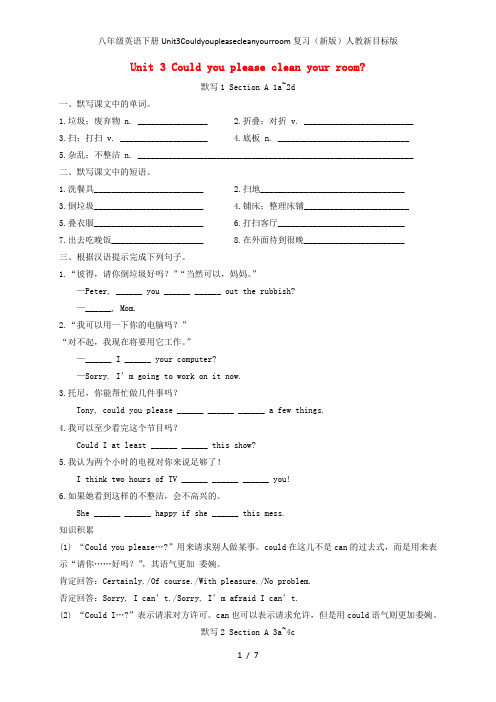
Unit 3 Could you please clean your room?默写1 Section A 1a~2d一、默写课文中的单词。
1.垃圾;废弃物 n. ________________2.折叠;对折 v. _________________________3.扫;打扫 v. ____________________4.底板 n. ______________________________5.杂乱;不整洁 n. _______________________________________________________________二、默写课文中的短语。
1.洗餐具_________________________2.扫地_________________________________3.倒垃圾_________________________4.铺床;整理床铺________________________5.叠衣服_________________________6.打扫客厅_____________________________7.出去吃晚饭_____________________ 8.在外面待到很晚_______________________三、根据汉语提示完成下列句子。
1.“彼得,请你倒垃圾好吗?”“当然可以,妈妈。
”—Peter, ______ you ______ ______ out the rubbish?—______, Mom.2.“我可以用一下你的电脑吗?”“对不起,我现在将要用它工作。
”—______ I ______ your computer?—Sorry. I’m going to work on it now.3.托尼,你能帮忙做几件事吗?Tony, could you please ______ ______ ______ a few things.4.我可以至少看完这个节目吗?Could I at least ______ ______ this show?5.我认为两个小时的电视对你来说足够了!I think two hours of TV ______ ______ ______ you!6.如果她看到这样的不整洁,会不高兴的。
Unit3-could-you-please-clean-your-room-知识点及短语
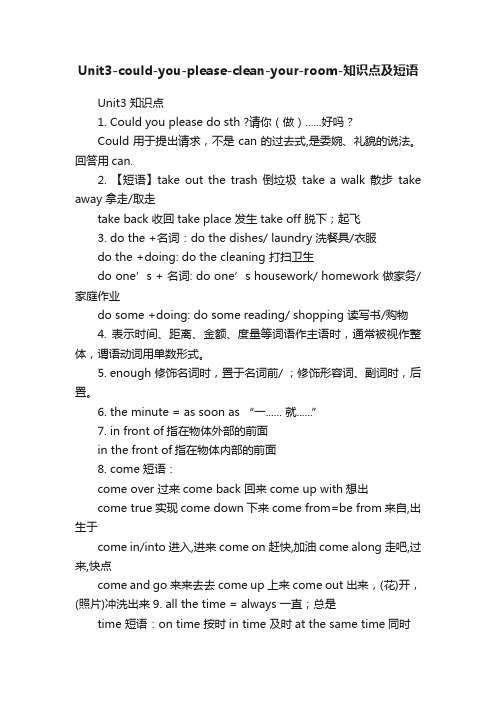
Unit3-could-you-please-clean-your-room-知识点及短语Unit3 知识点1. Could you please do sth ?请你(做)......好吗?Could用于提出请求,不是can的过去式,是委婉、礼貌的说法。
回答用can.2. 【短语】take out the trash 倒垃圾take a walk 散步take away 拿走/取走take back 收回take place 发生take off 脱下;起飞3. do the +名词:do the dishes/ laundry 洗餐具/衣服do the +doing: do the cleaning 打扫卫生do one’s + 名词: do one’s housework/ homework 做家务/家庭作业do some +doing: do some reading/ shopping 读写书/购物4. 表示时间、距离、金额、度量等词语作主语时,通常被视作整体,谓语动词用单数形式。
5. enough 修饰名词时,置于名词前/ ;修饰形容词、副词时,后置。
6. the minute = as soon as “一...... 就......”7. in front of指在物体外部的前面in the front of指在物体内部的前面8. come 短语:come over 过来come back 回来come up with想出come true实现come down下来come from=be from来自,出生于come in/into进入,进来come on赶快,加油come along走吧,过来,快点come and go来来去去come up上来come out出来,(花)开,(照片)冲洗出来9. all the time = always 一直;总是time 短语:on time 按时in time 及时at the same time同时the first time 第一次at times 有时last time上次next time 下次10. neither +助动词+主语“某人(主语)也不”neither …nor… 既不…也不…,做主语谓语动词符合就近原则。
2022年新人教版八年级英语下册第三单元知识点

Unit3 Could you please clean your room?一.情态动词could 旳用法1.提出礼貌旳规定Could you please (not) do sth ?请你(做)......好吗?用于提出祈求,但愿得到对方旳肯定回答,说话旳语调比较客气委婉。
Could 不是can 旳过去式,是委婉、礼貌旳说法。
回答用can.肯定回答:Yes,sure./ Yes, I can./Of course,I can./ Certainly./No problem./ With pleasure .否认回答:Sorry , I can’t / I’m afraid I can’t. I have to …,I’m going to…(阐明理由)2.表达祈求许可Could I do a sth? 我可以做......吗?肯定回答:Yes, you can ./ Yes ,please / Of course / Certainly./ No problem.否认回答:Sorry , you can’t / I’m afraid you can’t.3.could 为can旳过去式,表达过去旳能力。
= was / were able toSection A1. take out the rubbish把垃圾带出去2. do the dishes = wash the dishes洗碗碟3. fold your clothes折衣服4. sweep the floor扫地5. make your bed整顿床铺6. clean the living room打扫起居室7. do some washing/ shopping/ cleaning洗衣服/ 购物/ 做清洁8. go out for dinner出去吃晚饭9. go to the movies去看电影10. stay out late/ until nine呆到很晚/ 呆到9点钟11. get a ride撘车12. give sb a ride to town开车送sb到镇上13. need to do something需要做……14. have to do something不得不做……15. help out with a few things协助做些事情16. at least至少,多指数量或限度上旳最低限度。
人教版 八年级英语 下册 Unit3Could_you_please_clean_your_room
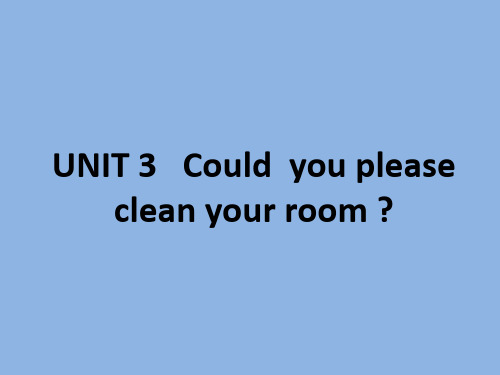
invite my friends to a party
go to the store use your CD player
Listen to a conversation between Sandy
a party? Parent: No, you can’t have a party.
You have a test on Monday.
Parent: Could you please…? Child: Yes, sure. / Sorry, I can’t. I
have to ...
clean your room
parents
5. go to the store 6. use your CD player 7. take out the rubbish
parents 8. make your bed
1b Use the phrases in 1a to make
conversations.
Parent: Could you clean your room? Child: Yes, I can. Child: Could I invite my friends to
Li Lei can’t dance , neither can I. neither can Mary. neither can we.
Neither of …是both of … 的否定句 Both of my parents are teathers .(否定句) Neither of my parents is a teacher .
八年级英语下册 Unit 3 Could you please clean your
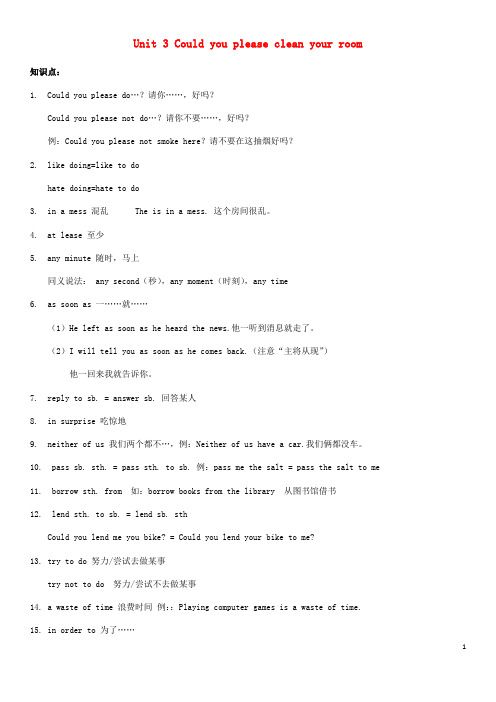
Unit 3 Could you please clean your room知识点:1. Could you please do…?请你……,好吗?Could you please not do…?请你不要……,好吗?例:Could you please not smoke here?请不要在这抽烟好吗?2. like doing=like to dohate doing=hate to do3. in a mess 混乱 The is in a mess. 这个房间很乱。
4. at lease 至少5. any minute 随时,马上同义说法: any second(秒),any moment(时刻),any time6.as soon as 一……就……(1)He left as soon as he heard the news.他一听到消息就走了。
(2)I will tell you as soon as he comes back.(注意“主将从现”)他一回来我就告诉你。
7.reply to sb. = answer sb. 回答某人8.in surprise 吃惊地9.neither of us 我们两个都不…,例:Neither of us have a car.我们俩都没车。
10. pass sb. sth. = pass sth. to sb. 例:pass me the salt = pass the salt to me11. borrow sth. from 如:borrow books from the library 从图书馆借书12. lend sth. to sb. = lend sb. sthCould you lend me you bike? = Could you lend your bike to me?13.try to do 努力/尝试去做某事try not to do 努力/尝试不去做某事14.a waste of time 浪费时间例::Playing computer games is a waste of time.15.in order to 为了……例: In order to get good grades, we should spend more time on schoolwork.为了取得好成绩,我们应该多花点时间学习。
Unit 3Could you please clean your rooMicrosoft Word 97 - 2003 文档 (3)
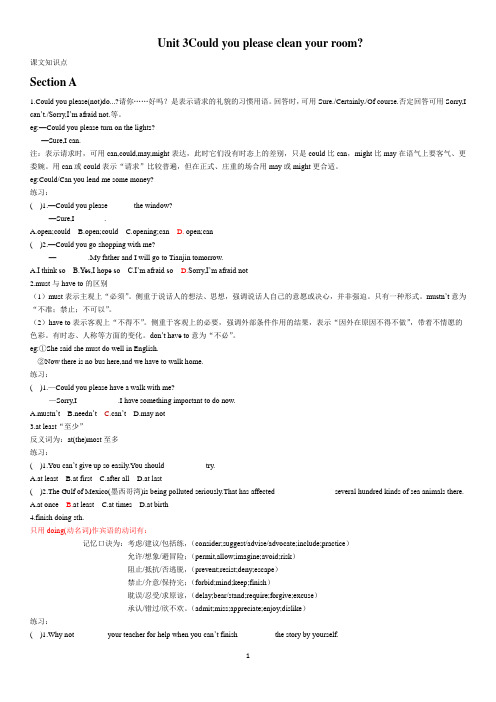
Unit 3Could you please clean your room?课文知识点Section A1.Could you please(not)do...?请你……好吗?是表示请求的礼貌的习惯用语。
回答时,可用Sure./Certainly./Of course.否定回答可用Sorry,I can’t./Sorry,I’m afraid not.等。
eg:—Could you please turn on the lights?—Sure,I can.注:表示请求时,可用can,could,may,might表达,此时它们没有时态上的差别,只是could比can,might比may在语气上要客气、更委婉。
用can或could表示“请求”比较普遍,但在正式、庄重的场合用may或might更合适。
eg:Could/Can you lend me some money?练习:( )1.—Could you please ______ the window?—Sure,I _______ .A.open;couldB.open;couldC.opening;canD. open;can( )2.—Could you go shopping with me?—________ .My father and I will go to Tianjin tomorrow.A.I think soB.Yes,I hope soC.I’m afraid soD.Sorry,I’m afraid not2.must与have to的区别(1)must表示主观上“必须”。
侧重于说话人的想法、思想,强调说话人自己的意愿或决心,并非强迫。
只有一种形式。
mustn’t意为“不准;禁止;不可以”。
(2)have to表示客观上“不得不”。
侧重于客观上的必要,强调外部条件作用的结果,表示“因外在原因不得不做”,带着不情愿的色彩。
八年级英语下册 Unit 3《Could you please clean your
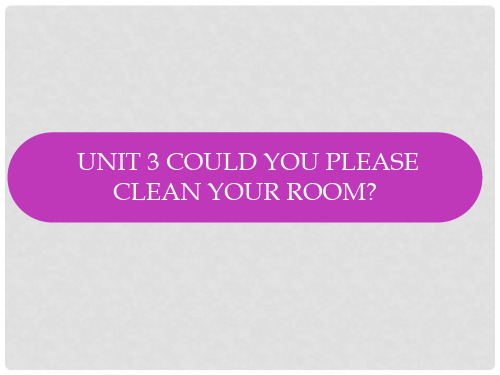
My opinion about doing chores
Do you think children should do some chores at home?
In my opinion, I think you teenagers should learn how to do chores and help your parents with housework. Nowadays, most of you
WRITE YOUR CONVERSATIONS
A: Mom, could I watch TV? B: Yes, you can. But could you please take
out the rubbiБайду номын сангаасh first? A: … B: …
Homework
自主整理和复习本单元所学的知识内容,并系统地写在 笔记本上。
depend on your parents too much. Doing chores can help develop your independence and teach
you how to look after yourselves well.
Since you live in one house with your parents, you should share the housework to have a clean and tidy home.
SELF CHECK
• Requests Could you please do your homework? Could you take out the rubbish out first? Could you come back before nine?
八年级英语下册Unit3《Couldyoupleasecleanyourroom》(讲)(含解析)(新版)人教新目标版
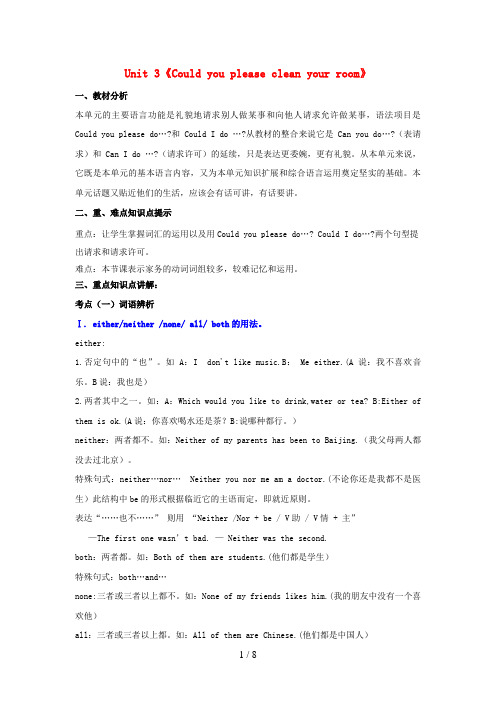
Unit 3《Could you please clean your room》一、教材分析本单元的主要语言功能是礼貌地请求别人做某事和向他人请求允许做某事,语法项目是Could you please do…?和Could I do …?从教材的整合来说它是Can you do…?(表请求)和Can I do …?(请求许可)的延续,只是表达更委婉,更有礼貌。
从本单元来说,它既是本单元的基本语言内容,又为本单元知识扩展和综合语言运用奠定坚实的基础。
本单元话题又贴近他们的生活,应该会有话可讲,有话要讲。
二、重、难点知识点提示重点:让学生掌握词汇的运用以及用Could you please do…? Could I do…?两个句型提出请求和请求许可。
难点:本节课表示家务的动词词组较多,较难记忆和运用。
三、重点知识点讲解:考点(一)词语辨析Ⅰ. either/neither /none/ all/ both的用法。
either:1.否定句中的“也”。
如 A:I don't like music.B: Me either.(A说:我不喜欢音乐。
B说:我也是)2.两者其中之一。
如:A:Which would you like to drink,water or tea? B:Either of them is ok.(A说:你喜欢喝水还是茶?B:说哪种都行。
)neither:两者都不。
如:Neither of my parents has been to Baijing.(我父母两人都没去过北京)。
特殊句式:neither…nor… Neither you nor me am a doctor.(不论你还是我都不是医生)此结构中be的形式根据临近它的主语而定,即就近原则。
表达“……也不……” 则用“Neither /Nor + be / V助 / V情 + 主”—The first one wasn’t bad. — Neither was the second.both:两者都。
八年级英语下册 Unit 3 Could you please clean your room短语、语法知识点汇总 (新版)人教新目标版

Unit 3 Could you please clean your room一、必背短语【教材内容解析】Section A1.Peter, could you please take out the rubbish? (P. 17)(1)Could you please...?意为“你能……吗?”,could在此并不是过去式,而是表示一种委婉的语气,please后接动词原形,肯定回答用Sure/Of course/Certainly,也可以用...can,不可以用...could;否定回答用Sorry...并给出理由,也可用...can’t/mustn’t。
---Could you please help me with my homework?--Sure./Of course./Certainly./Sorry, I can’t. I’m busy now.(2)take out意为“带出去”,代词作宾语时,要放在take和out之间。
The dog is noisy. Take it out.2.Could I at least finish watching this show? (P. 18)(1)at least表示“至少”,反义词为at most“至多”。
The ticket cost at least 200 yuan.(2)finish意为“完成、做好”,后接动词作宾语时,要用doing的形式。
When are you going to finish your work?3. Yes, because Mom will be back from shopping any minute now. (P. 18)be back意为“回来”,相当于come back,前者侧重指状态,后者侧重指动作。
She has been back for two days. You came back very late last night.4.And she won’t be happy if she sees this mess. (P. 18)mess用作名词,表示“杂乱、不整洁”,常用的短语为:make a mess“搞得一团糟”;in a mess“一团糟”。
Unit3-Could-you-please-clean-your-room课文讲解-

Unit3 Could you please clean your room?Section A1.Peter ,could you please take out the trash? 彼得,你能把垃圾倒了吗?【解析1】Could you please do sth ?请你(做)......好吗?用于提出请求,希望得到对方的肯定回答,说话的语气比较客气委婉。
Could 不是can的过去式,是委婉、礼貌的说法。
回答用can.【常用答语】肯定回答:Sure./ Of course./ Certainly./No problem.否定回答:Sorry , I can’t 【解析2】take out 取出(v+ adv)【注】: 跟代词做宾语,代词放中间;跟名词做宾语,可放在中间,也可放在后边【短语】take out the trash 倒垃圾take a walk 散步take away 拿走,取走take back 收回take place 发生take off 脱下;起飞The gift is in the box. You can take it out.2. Can you do the dishes.?那你可以洗盘子吗?do the dishes 洗碗【结构1】do the +名词:do the dishes/ laundry 洗餐具/衣服【结构2】do the +动词-ing do the cleaning 打扫卫生【结构3】do one’s + 名词do one’s housework/ homework 做家务/家庭作业【结构4】do some +动词-ing do some reading/ shopping 读写书/购物3.Could I at least finish watching this show? 至少让我看完这个节目可以吗?【解析1】Could I do a sth? 我可以做......吗?用于表达请求,语气比较委婉。
人教新目标版英语八下Unit 3《Could you please clean your room》
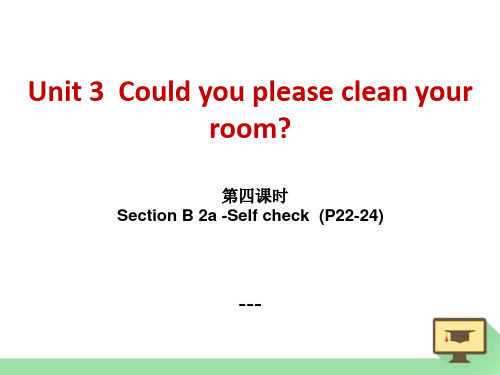
课前预习
【句型】 30. There is no need for them to do it now. ____没__有__必__要__现__在__就__做__。___________________ 31. It’s not enough to just get good grades at school. ___想__要__在__学__校__取__得__好__成__绩__这__是__不__够__的__。__________ __________________________________ 32. Doing chores helps to develop children’s independence and teaches them how to look after themselves. ____做__家__务__有__助__于__开__发__孩__子__的__独__立__性__和__教__他__们__如___ ____何__自__己__照__顾__自__己__。_________________
Unit 3 Could you please clean your room?
第四课时 Section B 2a -Self check (P22-24)
---
课前预习
【单词】 1. 精神压力n. ___s_t_r_e_s_s____ 2. 浪费; 垃圾n. 浪费; 滥用v._w_a_s_t_e_ 3. 提供v.____p_r_o_v_i_d_e__ 4. 而且; 加之adv. _a_n_y_w_a_y__ 5. 依靠v.__d_e_p_e_n_d___ 6. 发展v.____d_e_v_e_l_o_p____ 7. 独立n. __i_n_d_e_p_e_n_d_e_n_t__ 8. 公正性n. _f_a_i_r_n_e_s_s__ 9. 因为;既然conj.自从……以来prep.,conj. & adv.__s_i_n_c_e__
八年级人教新目标版英语下册知识点归纳:Unit3Couldyoupleasecleanyourroo
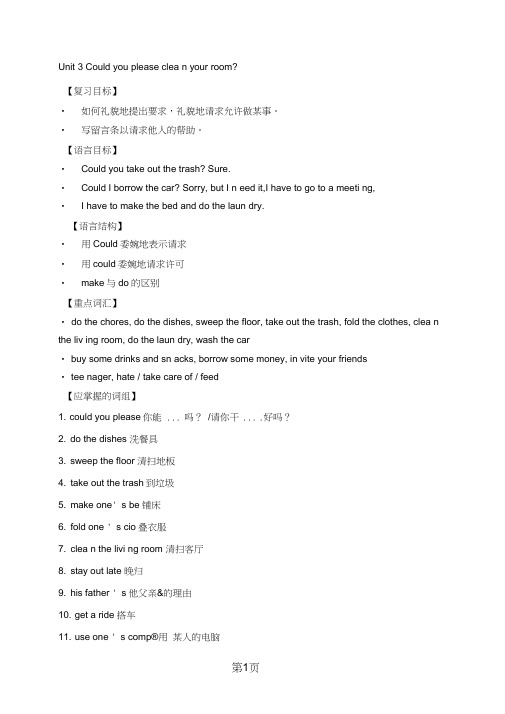
Unit 3 Could you please clea n your room?【复习目标】•如何礼貌地提出要求,礼貌地请求允许做某事。
•写留言条以请求他人的帮助。
【语言目标】•Could you take out the trash? Sure.•Could I borrow the car? Sorry, but I n eed it,I have to go to a meeti ng,•I have to make the bed and do the laun dry.【语言结构】•用Could委婉地表示请求•用could委婉地请求许可•make与do的区别【重点词汇】• do the chores, do the dishes, sweep the floor, take out the trash, fold the clothes, clea n the liv ing room, do the laun dry, wash the car• buy some drinks and sn acks, borrow some money, in vite your friends• tee nager, hate / take care of / feed【应掌握的词组】1. could you please你能 ... 吗?/请你干... .好吗?2. do the dishes 洗餐具3. sweep the floor 清扫地板4. take out the trash到垃圾5. make one' s be铺床6. fold one ' s cio叠衣服7. clea n the livi ng room 清扫客厅8. stay out late 晚归9. his father ' s他父亲&的理由10. get a ride 搭车11. use one ' s comp®用某人的电脑12. hate sth./to do sth讨厌某事/做某事13. do the laun dry=do some washi ng=wash clothe 洗衣服14. make breakfast, make dinner, do some cook ing故饭15. wash the ca刷车16. work on 从事,忙于17. work at学习、致力于、在.... 上下工夫18. borrow some money借一些钱19. i nvite sb. to do sth邀请某人做某事20. go to the store去商店21. agree sb. to do sth同意某人做某事22. agree with sb. =agree with what one say同意某人的意见23. (需了解)make a deal作成交易make a face做鬼脸;make a fool of捉弄,使出洋相make friends with 与...交朋友make a n ame for himself成名make a note of注意,记下来make free with擅自使用make fun of 取笑make…into把... 作成,使变成make it成功,到达某处make one' s livin g持生活make one' s way前往某处make room腾出地方make up编造make use of利用24. borrow sth. from sb向某人借某物(借入)25. lend sb. sth.=lend sth. to si:借给某人某物(借出)26. ask for要求得到、要求见到27. take care of = look after 照顾、照看、照料take good care of=look after …well28. n eed some help需要一些帮助29. come over 过来30. get angry 生气31. have a test考试32. make a clea n sweep of彻底扫除【应掌握的句子】1. Could you please clean your room?请你打扫一下你的房间好吗?翻译:彼得,你把这些垃圾倒出去,好吗?请你清扫地板,好吗?是的,当然可以。
unit3couldyoupleasecleanyourroom词句精讲精练(1)
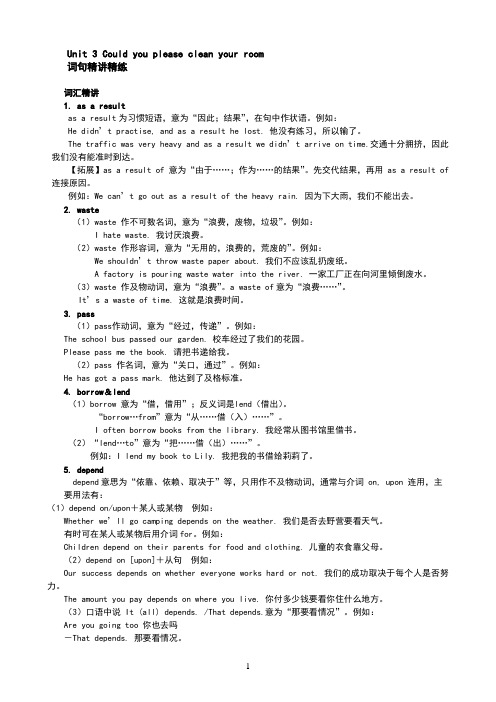
Unit 3 Could you please clean your room词句精讲精练词汇精讲1. as a resultas a result为习惯短语,意为“因此;结果”,在句中作状语。
例如:He didn’t practise, and as a result he lost. 他没有练习,所以输了。
The traffic was very heavy and as a result we didn’t arrive on time.交通十分拥挤,因此我们没有能准时到达。
【拓展】as a result of意为“由于……;作为……的结果”。
先交代结果,再用as a result of 连接原因。
例如:We can’t go out as a result of the heavy rain. 因为下大雨,我们不能出去。
2. waste(1)waste 作不可数名词,意为“浪费,废物,垃圾”。
例如:I hate waste. 我讨厌浪费。
(2)waste 作形容词,意为“无用的,浪费的,荒废的”。
例如:We shouldn’t throw waste paper about. 我们不应该乱扔废纸。
A factory is pouring waste water into the river. 一家工厂正在向河里倾倒废水。
(3)waste 作及物动词,意为“浪费”。
a waste of意为“浪费……”。
It’s a waste of time. 这就是浪费时间。
3. pass(1)pass作动词,意为“经过,传递”。
例如:The school bus passed our garden. 校车经过了我们的花园。
Please pass me the book. 请把书递给我。
(2)pass 作名词,意为“关口,通过”。
例如:He has got a pass mark. 他达到了及格标准。
4. borrow&lend(1)borrow 意为“借,借用”;反义词是lend(借出)。
- 1、下载文档前请自行甄别文档内容的完整性,平台不提供额外的编辑、内容补充、找答案等附加服务。
- 2、"仅部分预览"的文档,不可在线预览部分如存在完整性等问题,可反馈申请退款(可完整预览的文档不适用该条件!)。
- 3、如文档侵犯您的权益,请联系客服反馈,我们会尽快为您处理(人工客服工作时间:9:00-18:30)。
1) —Could you clean your room?
—Yes, I can.
2)—Could I invite my friends to a party?
—No, you can’thave a party.You have a test on Monday.
What isSandygoing to do?
What are Sandy and Dave going to do?
Fill in the chart.
Who
What
Sandy’s mom
buy some drinks and snacks
B: Yes, I can.
A: Could I use your CD player?
B: No, you can’t.
2.有意义操练(Meaningful Drills)
2d
情景展示:你要举行一个同学聚会,向你的同学求助,讨论求助的事情如下:
go to the store, buy some drinks and snacks, do the dishes,
3)能熟练掌握并使用下列重点句式:
(1) —Could you clean your room?
—Yes, I can.
(2)—Could I invite my friends to a party?
—No, you can’thave a party.You have a test on Monday.
能力
目标
能从材料中听出有效信息,完成听力任务,并能依据一定的材料信息,自行组成对话并表演出来。
情感
目标
通过本课的学习,培养学生热爱劳动,帮助他人的传统美德。
教学重点
本课时的重点词汇和句型。
教学难点
听说读写能力的培养和热爱劳动、帮助他人的良好习惯的培养。
教学方法
情景教学法;任务型教学法。
二、【教学流程】
First look at the models.
Parent: Could you clean your room?
Child: Yes, I can.
Child: Could I invite my friends to a party?
Parent: No, you can’t have a party. You have a test on Monday.
3. Read and try to remember the phrases. Then write the phrases on the blackboard.
II.Presentation
呈现
1. Learning tasks“示标定向”出示这节课的三维学习目标。
1)学习并掌握下列单词:
snack
八年级英语(下)第3单元第3课时
Unit3Could you please clean your room?
Section B1a—1e
一、【教材分析】
教
学
目
标
知识
目标
1.学习并掌握下列单词:
snack
2.能正确使用以下常用表达:
buy some drinks and snacks; borrow some money; invite sb. to a party; go to the store; take out the rubbish; make your bed; do the dishes.
2)能正确使用以下常用表达:
buy some drinks and snacks; borrow some money; invite sb. to a party; go to the store; take out the rubbish; make your bed; do the dishes.
2. Leading-in“导入新课”
(1) Play a game:
One student pretends to be the parent, the other pretends to be the child. Use the phrases in1ato make conversations.
环节
师生活动
二次备课
I.Preparation
准备
课前3分钟检查预习情况,并让学生区别snack与snake。
1.Revision “复习检查”
通过检查“学案”中“新知预习”内容检查预习效果。
2.1aLook at the phrases. Write parents or teenagers next to each phrase.
2.borrow some money 3.clean your room
4.invite my friends to a party
5.go to the store 6. use your CD player
Share their answers.
2. Listen again.
What isSandy’s mom going to do?
1.1c
T: Now let’s listen toSandy and Sandy’s mom .Listen and check the things in1athat you hear .Play the recorder.
Check up the answers:
1.buy some drinks and snacks
clean the living room , take out the trash
Ask two groups to act out.
3.交际性操练(Communicative Drills)
Writing
把口头描述的对话写下来,并在回答时适当发挥理由。
IV.Consolidation
巩固
Listening practice:
Then they can make their own conversations like this.
III.Practice操练 Nhomakorabea1.机械操练(Mechanical Drills)
1) Learn to talk about how to ask for one’s permission:
A: Could you please make your bed?
